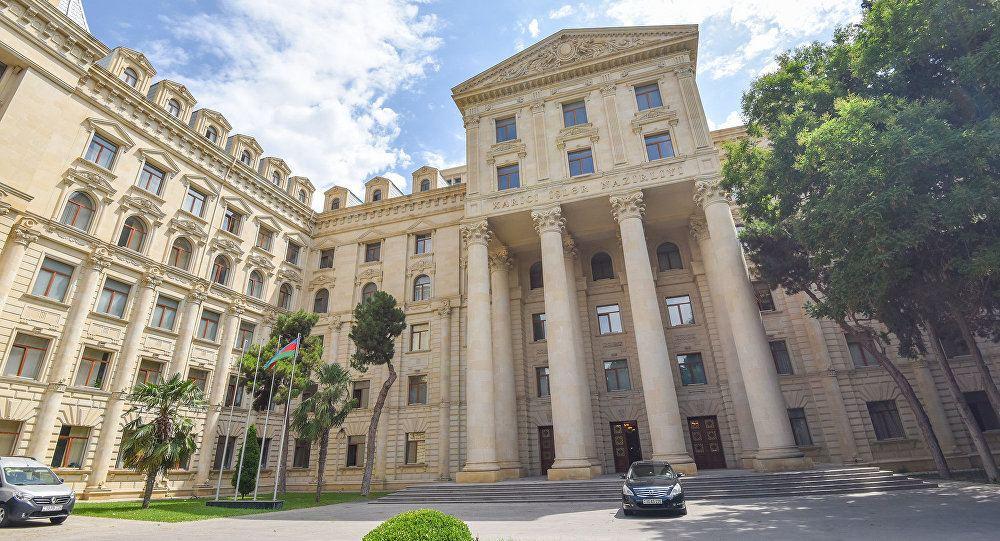MFA: French minister’s Nagorno-Karabakh statement unilaterial, pro-Armenian

By Vafa Ismayilova
The Azerbaijani Foreign Ministry has harshly criticized French Minister for Europe and Foreign Affairs Jean-Yves Le Drain’s statement on the status of the Nagorno-Karabakh region.
“Statement of Jean-Yves Le Drian, Minister for Europe and Foreign Affairs of France on the statement signed by the President of the Republic of Azerbaijan, the Prime Minister of the Republic of Armenia and the President of the Russian Federation on the cessation of all military operations is completely biased and contrary to its mandate as the co-chair of the OSCE Minsk Group,” the Azerbaijani Foreign Ministry said on November 11.
The ministry added that the statement “reflects a unilateral and clearly pro-Armenian position, [France] has no authority to speak on behalf of the other co-chairs”.
“Unfortunately, we have not observed the French Foreign Minister making any statements during all these years based on its mandate as the co-chair and the country that voted as a permanent member of UN SC in favour of 1993 resolutions, on the implementation of the related UN Security Council resolutions,” the ministry said.
“We do not remember when the demand for an immediate end to the illegal presence of the armed forces of Armenia in the internationally recognized territories of Azerbaijan and the return of those forcibly expelled from these territories was voiced by the French Foreign Ministry,” the statement added.
“Maybe France is not interested in the gross violation of fundamental human rights of hundreds of thousands of Azerbaijanis as a result of the conflict?! France should not be concerned about Azerbaijan's legitimate efforts to ensure the country's territorial integrity within its international borders and restore the human rights of more than one million Azerbaijanis in full compliance with international law,” the ministry stressed.
The statement by Jean-Yves Le Drain, which was posted on the French ministry’s website, says: “Discussions between the two parties must resume without delay. They must allow for the return of people displaced by the conflict in recent weeks, and for the definition of the future status of Nagorno-Karabakh.”
To recap, under the new peace deal signed by Armenia, Azerbaijan and Russia on November 10, no status is envisaged for the Nagorno-Karabakh region.
In the morning of November 10, Armenia, Azerbaijan and Russia signed an agreement to end the military conflict over the Nagorno-Karabakh region. Under the deal, Russian peacekeepers are deployed in the region to patrol frontlines. Turkey also takes part in the peacekeeping process. Turkey and Russia signed a deal on creating a Turkish-Russian joint ceasefire monitoring centre.
The clashes between Armenia and Azerbaijan resumed after Armenia launched large-scale attacks on Azerbaijani forces and civilians on September 27. Five Azerbaijani civilians were killed on the first day of the Armenian attacks. Ninety-three Azerbaijani civilians were killed in Armenian's indiscriminate attacks on Azerbaijani civilians. Azerbaijan launched counter-offensive operations that ended in the liberation of over 300 settlements, villages. Azerbaijan also liberated five city centres and the historic Shusha city.
The 44 days of war ended with the Russian-brokered peace deal signed on November 9 by the Azerbaijani, Russian and Armenian leaders. The peace agreement entered force on November 10 and envisages the de-occupation of Azerbaijan’s Kalbajar, Aghdam and Lachin regions by December 1 as well as the return of Azerbaijani IDPs to Azerbaijan’s Nagorno-Karabakh and the seven adjacent regions under the control of the United Nations High Commissioner for Refugees.
The peace agreement ended the 30-years-old conflict between Baku and Yerevan over Azerbaijan’s Nagorno-Karabakh region that along with the seven adjacent districts came under the occupation of Armenian armed forces in the war in the early 1990s. For about three decades, Armenia failed to implement the UN Security Council resolutions (822, 853, 874 and 884) demanding the withdrawal of its troops, which was the main obstacle to the resolution of the conflict.
The OSCE Minsk Group co-chaired by the United States, Russia and France had been mediating the Armenian-Azerbaijani conflict since the signing of the volatile cease-fire agreement in 1994. The Minsk Group’s efforts resulted in no progress as Armenia refused to abide by the UN Security Council resolutions.
--
Follow us on Twitter @AzerNewsAz
Here we are to serve you with news right now. It does not cost much, but worth your attention.
Choose to support open, independent, quality journalism and subscribe on a monthly basis.
By subscribing to our online newspaper, you can have full digital access to all news, analysis, and much more.
You can also follow AzerNEWS on Twitter @AzerNewsAz or Facebook @AzerNewsNewspaper
Thank you!
